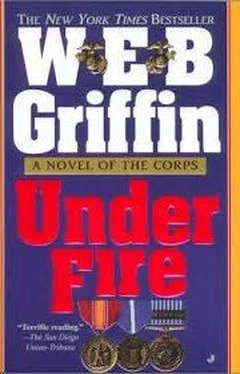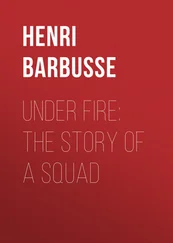Griffin W.E.B. - The Corps 09 - Under Fire
Здесь есть возможность читать онлайн «Griffin W.E.B. - The Corps 09 - Under Fire» весь текст электронной книги совершенно бесплатно (целиком полную версию без сокращений). В некоторых случаях можно слушать аудио, скачать через торрент в формате fb2 и присутствует краткое содержание. Год выпуска: 0101, Жанр: Старинная литература, на английском языке. Описание произведения, (предисловие) а так же отзывы посетителей доступны на портале библиотеки ЛибКат.
- Название:The Corps 09 - Under Fire
- Автор:
- Жанр:
- Год:0101
- ISBN:нет данных
- Рейтинг книги:5 / 5. Голосов: 1
-
Избранное:Добавить в избранное
- Отзывы:
-
Ваша оценка:
- 100
- 1
- 2
- 3
- 4
- 5
The Corps 09 - Under Fire: краткое содержание, описание и аннотация
Предлагаем к чтению аннотацию, описание, краткое содержание или предисловие (зависит от того, что написал сам автор книги «The Corps 09 - Under Fire»). Если вы не нашли необходимую информацию о книге — напишите в комментариях, мы постараемся отыскать её.
The Corps 09 - Under Fire — читать онлайн бесплатно полную книгу (весь текст) целиком
Ниже представлен текст книги, разбитый по страницам. Система сохранения места последней прочитанной страницы, позволяет с удобством читать онлайн бесплатно книгу «The Corps 09 - Under Fire», без необходимости каждый раз заново искать на чём Вы остановились. Поставьте закладку, и сможете в любой момент перейти на страницу, на которой закончили чтение.
Интервал:
Закладка:
Pickering typed out his own reports to President Tru-man, personally encrypted them, and personally took them to the communications center in the Dai Ichi Building, waited until their receipt had been acknowledged by Colonel Ed Banning at Camp Pendleton, and then person-ally burned them.
When Pickering told MacArthur that he already had an aide, Captain McCoy, General Willoughby had been visi-bly startled to hear the name, and Almond had picked up on that, too.
"The same McCoy?" MacArthur had inquired.
"Yes, sir."
"Ned," MacArthur said to Almond, "during the war, when we were setting up our guerrilla operations in the Philippines, Pickering set up an operation to establish con-tact with Americans who had refused to surrender. He sent a young Marine officer-this Captain McCoy-into Min-danao by submarine. Outstanding young officer. I person-ally decorated him with the Silver Star for that."
That was even less the truth, the whole truth, and noth-ing but the truth. MacArthur had originally flatly stated that guerrilla operations in the Philippines were impossi-ble.
President Roosevelt had learned there had been radio contact with a reserve officer named Fertig on Mindanao. Fertig, a lieutenant colonel, had promoted himself to brigadier general and named himself commanding general of U.S. forces in the Philippines. MacArthur and Willoughby had let it be known they believed the poor fel-low had lost his senses, and repeated their firm belief that guerrilla action in the Philippine Islands was, regrettably, impossible.
Roosevelt had personally ordered Pickering to send someone onto the Japanese-occupied island of Mindanao to get the facts. Lieutenant Kenneth R. McCoy, Gunnery Sergeant Ernest Zimmerman, and twenty-year-old Staff Sergeant Stephen M. Koffler, a radio operator, had infil-trated Mindanao by submarine and found Fertig.
McCoy's report that Fertig was not only sane (he had promoted himself to brigadier general on the reasonable assumption that few, if any, American or Philippine sol-diers who had escaped Japanese capture would rush to place themselves under the command of a reserve lieu-tenant colonel) but prepared, if supplied, to do the Japa-nese considerable harm. Roosevelt had ordered that Fertig be supplied. At that point, MacArthur had begun to call Fertig and his U.S. forces in the Philippines "my guerrillas in the Philippines."
When the U.S. Army stormed ashore later in the war on Mindanao, Fertig was waiting for them with than 30,000 armed, uniformed, and trained guerrillas. USFIP even had a band. In very real terms, except for artillery and tanks, USFIP was an American Army Corps. Army Corps are commanded by lieutenant generals. MacArthur continued to refer to Fertig as "that reserve lieutenant colonel."
In the face of that gross distortion of the facts, Pickering had felt considerably less guilty about saying McCoy was his aide.
"And what did your `aide-de-camp' have to say about what he saw on the wharf at Pusan?" Almond asked, smiling.
"General, this was an observation by an experienced of-ficer, not, per se, a criticism," Pickering said.
Almond nodded his understanding.
"McCoy said that most of the enlisted men are fresh from basic training, and that the officers and noncoms are also mostly replacements. There has been no opportunity for them to train together, nor has there been an opportu-nity for them to fire or zero their weapons."
Almond looked pained.
"Zimmerman checked their crew-served weapons,"
Pickering went on. "He knows about weapons. The 29th has been issued new.50-caliber Browning machine guns; they were still in cosmoline when they were off-loaded from the ships in Pusan. None of their mortars have been test-fired."
"God!" Almond said.
"The 29th was ordered to move immediately to Chinju, where it will be attached to the 19th Infantry of the 24th Division. The 19th has taken a shellacking in the last cou-ple of days-you heard the G-3 briefing just now. In these circumstances, McCoy doesn't think that either unit is go-ing to be able to offer much real resistance to the North Koreans."
Almond was silent a moment.
"I agree. That information would not have contributed anything to the staff conference, in the sense that anything could be done about it by anybody at that table. But I thank you for it."
"I thought you should know, sir."
"What Walker is doing is trying to buy enough time to set up a perimeter around Pusan, and hold that until we can augment our forces."
"I understand, sir," Pickering said.
"Between you and me, Pickering, that's all that can be done at the moment. The arrival of the Marine Brigade will strengthen the perimeter, of course, and the 27th Infantry is about to arrive. I understand they're better prepared to fight than, for example, the 29th is."
Pickering didn't reply.
"Maybe we'll get lucky," Almond said, as if to himself. And then he added, "Your `aide.' Is he still in Korea?"
"No, sir. He came in early this morning."
"I'd like to talk to him," Almond said. "Would that be possible?"
"Yes, sir. Of course. You tell me where and when."
"Would it be an imposition if I came by the Imperial?"
"No, sir. Of course not."
"I have to see General MacArthur," Almond said. "He normally sends for me fifteen, twenty minutes after the staff meeting. And there's no telling how long that will take; he's doing the preliminary planning for the amphibi-ous operation up the peninsula. But when that's over, I think I'll be free. If I'm not, I'll call. That Okay with you?"
"That's fine with me, sir. McCoy will be waiting for you."
"I don't want to make talking to him official," Almond said. "You understand?"
"Yes, sir."
"Then I'll see you in an hour or two," Almond said, of-fered his hand, and left the conference room.
Chapter Ten
[ONE]
THE DEWEY SUITE
THE IMPERIAL HOTEL
TOKYO, JAPAN
1105 25 JULY 1950
When Captain Malcolm S. Pickering of Trans-Global Air-ways started to walk down the corridor toward the Dewey Suite, he was mildly curious to see an American in a busi-ness suit-a young one, not more than twenty-one, he thought-sitting in an armchair in the corridor reading the Stars and Stripes.
He had apparently been there some time, for on a table beside him was a coffee Thermos and the remains of breakfast pastries.
Pick just had time to guess, some kind of guard, when there was proof. The young man stood up and blocked his way.
"May I help you, sir?" he asked.
"I'm going in there," Pick said, pointing at the next door down the corridor.
"May I ask why, sir?"
"I'm here to see General Pickering."
"Are you expected, sir?"
"No, I'm not."
"Sir, I'm sorry...."
"Knock on the door and tell General Pickering that Cap-tain Pickering requests an audience," Pick ordered, sound-ing more like a Marine officer than an airline pilot. He heard himself, and added, "I'm his son. It'll be all right."
After a moment's indecision, the young man went to the door to the Dewey Suite and knocked.
Captain Kenneth R. McCoy, in khakis, tieless, opened the door, then made a gesture to the young man to permit Pick to pass.
He entered the room. His father, dressed like McCoy, was looking at a map spread out on a table in the middle of the sitting room. He smiled when he saw his son.
"When did you get in?" he asked.
"A couple of hours ago. I dropped Stu James off at the Hokkaido and then came here. What's with the guard?"
"That's General Willoughby's idea," Fleming Pickering said.
"Oh?"
"He said it was his responsibility to see that `someone like me' was `secure.'"
"Secure from what?"
"Captain McCoy," Pickering said wryly, "who some people suspect is a cynic, suggests that General Willoughby wants to keep an eye on me for his security. Anyway, when I declined to move into some officers' com-pound where he could keep an eye on me, he sent me a guard here for the same purpose. Guards, plural. There's some young man sitting out there around the clock."
Читать дальшеИнтервал:
Закладка:
Похожие книги на «The Corps 09 - Under Fire»
Представляем Вашему вниманию похожие книги на «The Corps 09 - Under Fire» списком для выбора. Мы отобрали схожую по названию и смыслу литературу в надежде предоставить читателям больше вариантов отыскать новые, интересные, ещё непрочитанные произведения.
Обсуждение, отзывы о книге «The Corps 09 - Under Fire» и просто собственные мнения читателей. Оставьте ваши комментарии, напишите, что Вы думаете о произведении, его смысле или главных героях. Укажите что конкретно понравилось, а что нет, и почему Вы так считаете.










